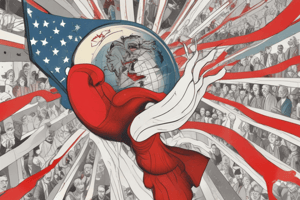Podcast
Questions and Answers
What similarities to power does the author see in Hitler, Mussolini, and Chavez?
What similarities to power does the author see in Hitler, Mussolini, and Chavez?
They all came into power from the inside, via elections or alliances with powerful political figures, and handed over power to autocrats.
What role do political parties and party leaders play in democracy?
What role do political parties and party leaders play in democracy?
They serve as democracy's gatekeepers.
Is there a foolproof advance warning system to identify authoritarians?
Is there a foolproof advance warning system to identify authoritarians?
False (B)
What are four behavioral warning signs of an authoritarian?
What are four behavioral warning signs of an authoritarian?
What are populists?
What are populists?
What three things do populists tend to do?
What three things do populists tend to do?
What is distancing in the context of pro-democratic parties?
What is distancing in the context of pro-democratic parties?
In what five ways can pro-democratic parties engage in distancing?
In what five ways can pro-democratic parties engage in distancing?
Why is it necessary for parties to join with ideological opponents in extraordinary times?
Why is it necessary for parties to join with ideological opponents in extraordinary times?
Study Notes
Rise of Authoritarian Leaders
- Hitler, Mussolini, and Chavez ascended to power through elections or alliances, showcasing a perilous pathway rooted in ambition and miscalculation.
- Establishment politicians overlooked the dangers of these outsiders, ultimately facilitating their rise to authority.
Role of Political Parties
- Political parties and their leaders act as gatekeepers of democracy to prevent authoritarian takeovers.
- Effective gatekeeping requires vigilance against emerging threats from radical figures.
Authoritarian Warning Signs
- No infallible method exists to predict authoritarian behavior, making vigilance essential.
- Warning signs noted by political scientist Juan Linz include:
- Rejection of democratic rules,
- Denial of opponents' legitimacy,
- Tolerance or encouragement of violence,
- Willingness to limit civil liberties, impacting media and opposition.
Understanding Populism
- Populists characterize themselves as representatives of "the people," opposing what they label a corrupt elite.
- They often delegitimize established parties, portraying them as undemocratic and unpatriotic.
Populist Tactics
- Populists typically engage in:
- Denying the credibility of existing political parties,
- Claiming the political system is corrupted by elites,
- Promising to restore power to the public while undermining democratic institutions post-victory.
Distancing from Extremism
- "Distancing" refers to mainstream parties' strategy to isolate and combat extremist forces effectively.
- Methods of distancing include:
- Excluding potential authoritarians from ballots,
- Purging extremist elements from their ranks,
- Avoiding alliances with antidemocratic entities,
- Isolating rather than legitimizing extremists,
- Forming a united front against serious electoral threats.
Necessity of Cross-Ideological Alliances
- Joining forces with ideological opponents may seem counterintuitive, yet it becomes crucial during crises.
- Demonstrating leadership by prioritizing democracy can unify parties to counter extremist threats and safeguard democratic integrity.
Studying That Suits You
Use AI to generate personalized quizzes and flashcards to suit your learning preferences.
Description
Explore the dynamics behind the rise of authoritarian leaders such as Hitler, Mussolini, and Chavez. This quiz will delve into the warning signs of authoritarianism and the crucial role political parties play in preserving democracy. Understand the implications of populism and how it relates to modern political landscapes.




